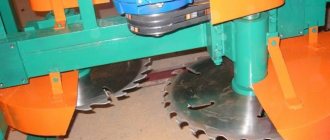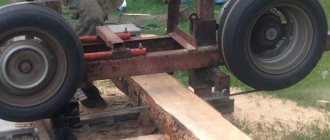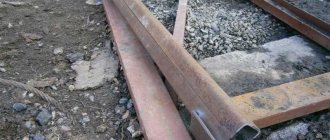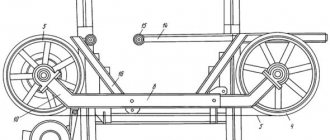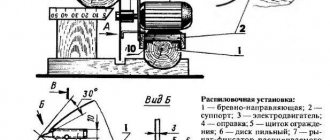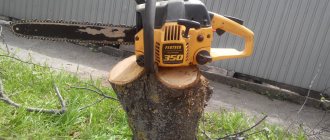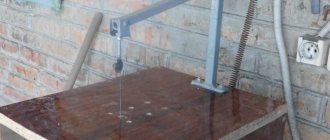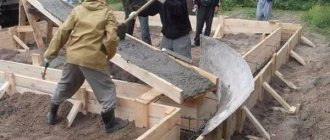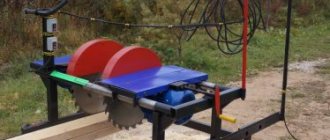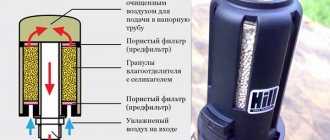Making a machine from a grinder
You need to approach the creation of a large sawmill gradually. This is due to special safety precautions when working with saws.
The most basic type of machine is a sawmill made from a grinder. It can be assembled with your own hands in literally a few hours if you have a ready-made saw blade. Of course, it is difficult to call it a sawmill in the broad sense of the word, however, for the first time it is quite suitable for gaining experience. A good grinder has a power of about 2 kW and a rotation speed of up to 3 - 5 thousand rpm. With this device, boards with a thickness of no more than 50 mm are cut and used as an additional circular saw in carpentry shops.
To make this sawmill you need: the grinder itself, a 250 mm circular saw, a small table with a tabletop and a sheet of iron 1 - 1.5 mm thick. The protective cover is removed from the angle grinder.
The tabletop is covered with thin tin for better sliding of lumber. Then a slot is made in the center of the table for the saw blade. This gap should be 3–4 cm in length and 1.5–2 cm in width larger than the disk. This is necessary for saw adjustments and self-removal of sawdust. The saw blade is secured to the grinder with standard nuts. This tool is then securely fixed to the bottom of the tabletop with clamps and bolts. In this case, the saw part of the blade itself should protrude from the top of the table by about 10 cm.
The sawmill is almost ready for work. You just need to install and strengthen the ruler along the sawing using clamps or bolts as in the photo. It is needed to support the board during dissolution. It is also used to regulate the width of lumber production.
The height of the saw blade can be adjusted by raising or lowering the tabletop. To do this, one edge is secured to hinges, and the other to high adjusting bolts. Then with such a machine you can cut grooves and quarters on boards, which is often necessary in the production of joinery.
Saving.
The article talked about saving energy when operating a band sawmill. Indeed, a band sawmill can significantly reduce energy costs. This can be verified experimentally. The band sawmill has a cut measuring 3 mm - from a log with a diameter of 28 cm, using a band saw you can get 10 boards 27 mm thick.
The cutting diameter of the circular sawmill is 6-9 mm. From a log with a diameter of 28 cm you can get 8 boards with a thickness of 27 mm.
Thus, the production volume of a band sawmill is higher, and the level of waste is half that of its disk counterpart. One shift processes about 20 logs - a band sawmill is capable of producing 200 boards per shift, and a disk sawmill only 160. With the help of a band sawmill, you can produce 40 more boards in one shift. Within a week, the efficiency of the tape machine will be 200 boards more, and within a month - by 800 boards.
If we convert the production volumes of a band sawmill into a monetary equivalent, the entrepreneur will receive 250,000 rubles more than when using a disk saw.
Another advantage of a band sawmill is the ability to cut bulky logs like cedar or oak. A circular sawmill will not be able to cope with such wood, and this is fraught with loss of time and money.
Sawmill made from a hand-held circular saw
The fastest way to make a sawmill is to use a standard hand-held circular saw, which can be purchased at any hardware or hardware store. It is fixed in the same way as a grinder at the bottom of the table top, a slot is made for the disk and a ruler for the stop. The machine is ready for use.
This device has one advantage over a grinder machine. The standard model of a hand-held circular saw provides an inclination of the cutting tool from 0 to 70 degrees, which allows you to make cuts at different angles. This is necessary when making, for example, triangular skirting boards or shaped slats. In the production of wooden window frames, a special angle saw (angle saw) is often needed, for which hand-held circular saws are precisely suited.
Features of woodworking production.
An entrepreneur who is engaged in timber processing and uses a band or disk sawmill in production must take into account aspects of the operation of the machine and safety precautions. Only experienced workers who can determine the degree of dullness of the saw, ensure the operation of the cooling system and notice problems in the operation of the machine in time should be allowed to work. Such measures will help prevent the appearance of defects in the form of a “wave” on the surface of the board and an unexpected stop in production.
Large homemade device
For such a powerful unit, a reliable frame is made of channels and angles. The following will be mounted on it: an electric motor with a power of 3–5 kW, a movable subframe and an adjustment system for the operation of the machine. The sawmill also includes a carriage, guide rails and devices for holding the logs from moving.
If in circular saws the operator needs to feed lumber to the saw, then here it is the other way around. The log is secured to the base in front of the frame, and the sawing unit itself is pushed towards the workpiece along the rails. When moving parts are installed and adjusted correctly, operation occurs smoothly and without effort on the part of the operator. This machine is capable of cutting workpieces horizontally and vertically. The rotation of the engine with the saw is carried out by the worker.
When moving forward, the blade makes a horizontal cut. After passing, the operator turns the engine 90 degrees, the saw becomes vertical. A backward movement is made while simultaneously cutting the log. After which the subframe with the engine is lowered using an adjusting screw to the specified size. And then a new cycle of work is repeated. It only takes about 2 - 3 minutes to move forward and backward.
Of course, you can make a sawmill that will cut both horizontally and vertically at once. But for this you need two electric motors of the same power and rotation speed. At the same time, the design of the unit will become significantly and unjustifiably complicated, which is unprofitable at home.
Read also: Carbon dioxide pressure when welding semi-automatically on a gearbox
A homemade corner circular sawmill can cut from 5 to 8 cubic meters of wood in one working day. It is used to make:
- preparations of linear lumber;
- multilayer timber for house construction;
- radial and edged lumber for carpentry;
- parquet board;
- They make individual cutting of logs for special purposes.
The corner disc sawmill has a number of advantages over a band saw of the same type. Namely:
- the smallest amount of sawing waste;
- high reliability;
- eliminates waviness of the board surface. With band sawmills this happens when the saw band is poorly tensioned;
- high quality of circumcision;
- sawing takes place in one installation.
Large woodworking enterprises use the Finnish Kara disc sawmill. It is a two-saw system with a moving belt for feeding wood. Capable of dissolving logs up to 80 – 90 cm thick. Capacity up to 20 cubic meters per hour. It has a complex control system. Maintenance staff 2 people. The disadvantage is the high price not only of the sawmill itself, but also of the saw blade, which costs about 20 thousand rubles. For sawing hard wood, such as oak or larch, discs with stellite tips are used. These saws are several times more expensive than simple ones.
Homemade production of such machines is not carried out due to their complexity and the high cost of individual components.
In private households, a do-it-yourself circular sawmill makes it possible to produce timber and boards from logs of medium and large sections. With the growth of the expected volume of production, the requirements for accuracy, thoroughness in assembly work, and the quality of the materials used increase.
Purpose
This equipment is designed for horizontal and vertical sawing of wood without turning the workpiece. It is used in the production of lumber of various qualities, including export. With its help you can make both a thin board and a square beam of various sizes.
The corner sawmill can produce all types of woodworking products from round timber of any species. For example, edged lumber (including radial), profiled timber, parquet, etc.
Using such a machine, you can make the surface of the finished product as smooth as possible. Taking this into account, circular sawmills are now widely used in the woodworking industry.
Design selection
The design of a circular sawmill is being developed for specific needs. Productivity, log width, even cut along the entire length of the workpiece require certain technical solutions in the assembled equipment. When feeding manually, the plane wave of the resulting board increases. The size of the saw blade and the limits of its displacement relative to the stop pad will determine the maximum size of the wood for sawing.
Main nodes
The components of the future machine must first be correctly positioned on the drawing. The device of any homemade disk sawmill includes:
- frame. Unites all components into a functional whole. At the same time, the distance between parts must allow for safe DIY work, maintenance, cooling, and waste disposal. The main qualities are stability, rigidity;
- engine. The electric three-phase version is selected according to power and number of revolutions. Operating voltage 380 V. If there is no connection to the network, install a gasoline engine with a step-up gearbox;
- cutting unit. Placed horizontally, vertically. Consists of one disk or two (corner). A single saw can be fixed in one specified position or rotated 90° to eliminate reverse idling (cutting an angle);
- supply line. A simple homemade product is limited to a fixed table with manual feed. This type is used for small DIY work with small workpieces. A massive log is fed under the knife on a carriage;
- Remote Control. Performs on/off operations, available control switches (revolutions, feed, indication). It is carried out to a place on the frame that is convenient for work and control of the process.
Despite the fact that manufacturing takes place at home, safety precautions must be observed - cover the rotating parts with a casing, and install a protective sheet of metal on the operator’s side to prevent the disc from flying apart. Woodworking circular sawmills are classified as high-risk equipment.
Two disks
The design of a circular sawmill with two simultaneously operating cutting tools allows the processing productivity to be increased. They are located at right angles to each other. Such homemade devices are more difficult to manufacture.
Each disk is equipped with its own motor and drive. The rotation frequency is selected to be the same.
The horizontal movement of the angular pairs of the disk with the drive mechanism occurs on a movable carriage. Guides are placed under it. To adjust the relative position of circular saws with your own hands, each pair is equipped with adjustment devices.
Disc manufacturing and balancing
The sawmill is high-risk equipment. When manufacturing a circular saw, safety precautions must be observed: rotating parts must be closed.
To make a disk yourself, you will need either a steel or duralumin blank with a diameter of about 45 cm and a thickness of 0.3 cm. To turn this blank into a saw, you just need to make just a couple of teeth on it. You can do more, but two will be enough for the tool to cope with any tree.
Cutters can be created from metal plates. When they are ready, all that remains is to attach them to the disk by welding.
After you have made a homemade circular sawmill with your own hands, you will need to balance it in order to improve the quality of the cut. The cutting element is fixed to the shaft . It can be turned on a lathe, and although careful balancing is not necessary, the blade should not be allowed to come into contact with the walls of the cut. The saw will work well with the cutters at an angle of about 30 degrees, and the back angle should be 15 degrees.
Making a sawmill is a simple process that requires only small financial investments to purchase the necessary components. In general, a homemade saw will cost much less than a machine purchased ready-made.
A mini sawmill will be an excellent device for starting a woodworking production or independently constructing a wooden cottage. Today, many people build and repair wooden buildings with their own hands. In order to quickly and efficiently process a tree trunk, you need to use a sawmill. In this article we will talk about how to make a mini sawmill.
Drawing and material
Depending on the design, drawings of a circular sawmill of varying complexity are drawn up. In custom development, certain requirements must be taken into account.
- Using log feed on a carriage, the width of the platform is taken equal to the width of the guide rails. This will ensure stability under load. The rail is taken P50, the rollers are selected accordingly;
- on the platform, provide clamps for a tree trunk, convenient, reliable fixation of various sizes of workpieces;
- It is advisable not to combine an electric motor and a saw on a rigid drive. It should be protected by a belt (chain) drive. This will improve the air cooling of the windings and remove them from the zone of intense wood dust formation. Before creating a drawing with your own hands, you need to measure the dimensions of the engine; with the same characteristics, the manufacturer gives its size according to the overall dimensions;
- calculate the working area for a saw Ø 500 – 700 mm;
- The frame, depending on the dimensions of the installation, should be welded or dismountable (moving to a new place of work). Channel No. 4, No. 6 are placed in the main harness. Additional stiffening elements are made from steel corners and pipes (if necessary).
Read also: Drawings of a press for the production of technoplankton
Conclusions and recommendations
Thus, when planning to purchase a sawmill for work, it is necessary to take into account a number of factors, such as the nature of the lumber that will primarily be dealt with, the qualifications of the operating personnel (including experience with various saws), the internal conditions of the enterprise and the associated priorities.
You should also remember:
- the quality of edged lumber produced on a corner sawmill is higher than that of strip and frame equipment;
- the cost of saw blades for corner sawmills is quite high, but its maintenance costs are lower and its service life is higher than that of tools for band sawmills;
- for the most efficient sawing and achieving high productivity on angle saws, it is necessary that the power of the motors on the saw spindles be at least 22 kW;
- To increase the productivity of the sawmill, mandatory mechanization of loading and unloading operations on the machine will be required, as well as automation of all processes.
Assembly order
The DIY installation process is divided into 3 stages. After each, the dimensions, tolerances, and stroke limits of the moving parts are checked against the working drawing.
- Support frame frame. Welded (bolted) joints are made. They check the quality, diagonals, location of seats, stability.
- Feeding part. In the case of a fixed table, the level is set to a horizontal plane. The coincidence of the longitudinal axis with the supporting frame is recorded. For a moving platform, first place the rails at the same level coaxially with each other and the base. Load the trolley with a check for smooth running and no chafing of the wheel flanges. A small homemade circular sawmill can have a light trolley on bearings and rollers. For them, a guide track is made from a corner for passage forward and backward. On larger models, the principle of moving a carriage with a disk above a log fixedly fixed on the table is used.
Household disc sawmill Astrogan 2
- Cutting organ. The first to be installed is the sawmill shaft with the saw. The support bearing assembly is mounted on the subframe, the axis of rotation and the presence of runout are checked. Then the engine is hung on the mounting slots. The fastening bolt should not be located at the edge of the groove. If a V-belt/chain drive is used, then with repeated revolutions it becomes loose and subsequent tensioning is necessary. When replacing with a new product, the motor is again fed closer to the shaft. Continuous adjustment can be made with spacer bolts on each side. A heavily tensioned belt or chain will overheat when the equipment is in use for long periods of time.
When assembling a corner sawmill with your own hands with a block of disks on a movable carriage, the design distances are controlled along the entire length of the stroke. An unexpected change in saw angles during sawing will lead to damage to raw materials and an accident.
Review of popular models
One corner saw can replace multiple machines by reducing the time spent on operations, increasing productivity, and freeing up additional manpower.
PDPU-600
The single-saw (single-disc) corner rotary sawmill PDPU-600 is equipped with a circular saw with a diameter of 600 mm. The saw unit is mounted on a carriage. There is the possibility of horizontal and vertical sawing of logs. Productivity 8-12 m/min. Product yield up to 74%.
Specifications:
- diameter of the processed log – up to 900 mm;
- processed log length – up to 6000 mm;
- saw blade diameter – 600 mm;
- saw motor power – 15 kW;
- rotary unit drive power – 0.37 kW;
- engine power for vertical movement of the carriage – 0.37 kW;
- maximum dimensions of the resulting timber – 210×210 mm;
- overall dimensions of the machine (without guides) – 1400x2000x1800 (mm);
- rail track length – 10500 mm;
- assembled machine weight – 1000 kg;
- productivity of edged lumber – up to 6m3/shift;
- lumber yield – up to 74%.
The workpiece is secured to the guides using clamps. When sawing a log, it does not need to be turned or re-secured.
Main advantages:
- vertical movement of the saw carriage and rotation of the saw blade are carried out using an electric drive;
- it is possible to install additional options (laser cut indicator, electromechanical feed, etc.);
- can be equipped with a gasoline engine;
- has a small mass;
- compact;
- relatively inexpensive.
Flaws:
- it is necessary to level the rails with a level, with high accuracy;
- very thick lower croaker due to high hooks;
- sawdust constantly sticks to the chain feed roller of the portal, causing the chain to break;
- weak iron for the resulting vibrations and loads;
- To adjust the positions of the disks, the bolts are not with fine threads.
This sawmill is perfect for sawing small volumes of wood.
GRIZZLY-1000/150A
The machine is designed for sawing wood of various species into edged boards or timber.
The saw unit is a carriage with circular saws located orthogonally, which moves along a permanently fixed log. It is possible to make both tangential and radial cuts. Product yield up to 70%.
Specifications:
- diameter of the processed log – from 100 to 1000 mm;
- length of processed log – from 1000 to 6300 mm;
- vertical disk diameter – 450 mm;
- horizontal disk diameter – 400 mm;
- total power – 24.95 kW;
- feed speed – from 0 to 48 m/min;
- the maximum dimensions of the resulting timber are 150x150 mm;
- overall dimensions of the machine – 8950x2860x2960 (mm);
- machine weight – 1800 kg;
- control mode – automatic;
The design of the feed mechanism is electromechanical, which ensures rigid coupling of the mechanisms and prevents slipping or jamming when sawing.
The machine bed is a durable and wear-resistant structure, resistant to loads and vibration, which ensures reliable operation of all components and assemblies.
The Grizzly sawmill does not require a foundation, just compacted soil.
Clamps allow you to securely hold the workpiece on the sawmill bed. Due to the stationary fastening of the log, the absence of additional loads and vibrations is ensured.
Main advantages:
- maximum radial cut;
- workpiece diameter up to 1 meter;
- ability to work in any climatic conditions;
- finished products of export quality;
- compliance with safety requirements;
- there are no requirements for log curvature;
- stepless adjustment of carriage feed;
- cleaning sawdust into the machine hopper.
Flaws:
- imbalance of the structure (the left side is loaded with the carriage, the right side is empty);
- the guide beam is not fixed rigidly enough;
- For an ideal radial cut, the horizontal and vertical discs must be identical.
Thus, having considered two models with different characteristics, the consumer can choose the most suitable option for himself.
These shortcomings were identified during actual work on sawmills of the above-described models.
Individual approach
Where a high-capacity sawmill is not required, a mini-machine with a sliding feed on a stationary plate is designed.
As the weight and length of the workpiece increases, the table is equipped with freely rotating rollers to facilitate manual pressure.
A universal solution would be a rotary (90°) gearbox for a circular saw. In some cases, the owner prefers to install end clamps to rotate the workpiece around the longitudinal axis.
Moving the tree or saw is a crucial issue in the design of a sawmill.
If you find an error, please select a piece of text and press Ctrl+Enter.
Making a circular sawmill with your own hands can significantly reduce the cost of equipping a small woodworking workshop.
Scheme of a homemade sawmill.
DIY chain sawmill
The design of this unit is simpler and smaller in size than its belt counterpart. It works on the same principle, differing only in the type of saw. In this case, a special chain stretched over a tire is used to cut logs.
It is much easier to make it; you just need to strictly follow the tips on how to make a homemade chain-type sawmill.
Note!
Do-it-yourself electric scooter - a master class with step-by-step instructions for doing it yourself. Tips and simple patterns for beginners + the best photo reviews
DIY rocking chair: TOP-120 photos of the best manufacturing options. Master class on creating a rocking chair at home
Smokehouse from a gas cylinder - the best master class on making a homemade smokehouse with step-by-step photo diagrams for beginners
Purpose of the unit
Wood is one of the most common and sought-after building materials. The most popular method of wood processing is sawing the material using saws of various designs. Very often, circular saws are used as sawing equipment. This design allows you to quickly and efficiently produce edged and unedged lumber from ordinary round timber; you can also easily produce timber, boards or slats in accordance with given dimensions.
Disc units can be used to carry out sequential processing of wood after cutting using a band saw and for the production of primary lumber.
Such equipment has a high level of productivity, as it has the ability to carry out longitudinal and end processing, as well as division.
A circular sawmill is an indispensable piece of equipment for the construction of wooden houses; its use allows you to speed up and simplify construction work.
The use of this equipment is especially effective when longitudinally sawing large timber. This procedure only takes a few minutes.
What to look for when choosing
When choosing a corner sawmill, you need to pay special attention to the characteristics of the saw unit, namely the quality of workmanship and the diameter of the discs, the power and speed of the drive motor.
The optimal choice of saw unit parameters will contribute to the efficient operation of the entire sawmill. Do not forget about other technical characteristics, since the potential for using the equipment and the profitability of the enterprise depend on them.
A few details to remember:
- The length of the supplied workpieces depends on the size of the particular machine.
- It is better to choose machines with the same disk mounting diameter.
- The sawmill has restrictions on the diameter of the wood processed.
- More powerful circular saw motors improve operating efficiency.
If you're interested in getting the most out of miter sawing, you shouldn't skimp on cutting tools or automation.
The correct selection of a circular sawmill can significantly increase labor productivity, while saving time and reducing energy costs. In addition, a high-quality woodworking machine will have a positive effect on the quality of the finished product.
Installation design
A circular sawmill is a hardware machine that performs longitudinal sawing of wood. The operation of the equipment is ensured by using an electric motor of appropriate power as a power drive. The main elements of the sawmill are:
- two electric motors;
- circular saws;
- rail guides;
- carriages.
The elementary design of the installation is a table on which a shaft with a disk is mounted, the cutting part of the latter rotates above the plane of the table.
Sawing installation of a sawmill.
This homemade circular sawmill is most often used in domestic use. The industrial installation has a more complex structure and is equipped with circular saws, which have the ability to change the cutting angle during operation.
The main working element of the installation is a circular saw, which is mounted on the spindle shaft of the installation or on the shaft of the electric motor. Depending on the design, such installations can be single- or multi-saw. In a multi-saw unit, separate electric motors are used to drive the working tool, which may not match each other in power.
Read also: What is carbide used for in construction?
The frame of the installation is mounted from durable pipes, which are held together by welding. The design of the equipment uses rails as guides on which metal carriages are installed to move the saw unit.
Where to start making?
Any master has a question about how to make a device so that it has certain abilities. It is necessary to develop an installation diagram. It should include a number of main components:
- guides for moving the tool frame (rail track);
- the frame itself on which the instrument is mounted;
- clamp for workpieces (logs);
- auxiliary devices for fixing and moving the tool along the frame.
General view of the design of the simplest circular sawmill: 1 – guides; 2 – tool frame; 3 – saw blade; 4 – V-belt gearbox.
Operating principle of the device
The installation can operate both indoors and outdoors. The use of the unit allows you to obtain a smooth cutting surface. If a corner sawmill is used in the process, then sawing of the forest can be carried out in two planes simultaneously: both along and across the longitudinal axis of the log. This is achieved due to the fact that the working elements are located in two perpendicular planes. This type of installation can work with any wood.
Drawing of a sawmill with dimensions.
If a double-disc sawmill is used for sawing, then it is possible to saw logs whose diameter exceeds 70 mm in two perpendicular planes. The cutting width can be no more than 1 mm.
Transverse and longitudinal sawing of logs on such installations can be carried out simultaneously in both directions when moving along rails that guide the portal with saws installed on it. The portal and carriages move using a drive equipped with an electric motor. The speed of movement of the unit is adjusted in steps by using a chain transmission.
Installation does not require installation on a special platform or foundation. The main thing is that all electrical components of the structure must have reliable protection from precipitation. When setting up equipment, an electronic ruler is often used, which allows you to easily adjust cutting parameters automatically.
Electrical equipment, light, lighting
0 votes
+
Vote for!
—
Vote against!
Modern sawmill production and private development require a disk or band sawmill with a performance reserve and high technical characteristics. The many advantages of these machines allow us to confidently assert that circular sawmills are the most successful solution for all woodworking industries, regardless of the scale of production and the range of products.
The purpose of the circular sawmill
Wood is one of the most popular building materials. High strength and unique structure make it possible to use wood in the construction of buildings, exterior and interior decoration. The scope of application and quality of this natural material depends largely on the woodworking equipment used.
A popular method of wood processing is sawing the material using frame, band and circular saws. The disk design, for example, makes it possible to produce edged and unedged lumber, such as beams, boards and slats, from round wood with high quality and quickly.
Disc machines can be used for sequential processing of wood after cutting with a band saw and creating material from logs. Such equipment is distinguished by a high level of productivity, because among the design capabilities, longitudinal edging, end sawing and dividing stand out.
When constructing wooden houses and in carpentry shops, a circular sawmill is simply irreplaceable. It can significantly speed up and simplify the entire work process, while saving a lot of effort and time. Without such equipment, longitudinal cutting of a large beam will take the owner more than one hour, but thanks to a circular sawmill it will happen in a matter of minutes.
Disc sawmill design
A circular sawmill is a hardware machine that produces longitudinal sawing of trees and operates thanks to an electric motor. Looking at the drawings of a circular sawmill, it becomes clear that the main design elements are two engines, circular saws, a movable operator's cabin, a rail track and carriages.
The elementary design consists of a table on which a shaft with a disk is mounted, and its cutting part rotates above the plane. This simple design is suitable primarily for domestic use, but industrial production requires more complex equipment equipped with disks that can change the sawing angle.
The main working element is a circular saw, which is usually installed on the machine spindle shaft or on the motor shaft. Each of the circular saws is driven by a separate engine, and their power does not always match. According to their design, disc sawmills can be single- or multi-saw.
The metal frame of the circular sawmill is made of strong metal pipes and fastened by welding. For the carriage as guides, it is best to choose the highest quality rails without external defects, otherwise the carriage wheels will jump off or get stuck.
The carriage itself is assembled from metal parts. The rollers or wheels must fit perfectly under the rails. It should also be remembered that the frame itself, where the rollers are attached, must match the distance between the rails very accurately. Only then will the carriage move freely and smoothly.
To drive a circular saw, it is customary to use any gasoline engine. It is desirable that the motor be more powerful, because it will have to work on two saws. In order to prevent overheating of the drive, it is recommended to exclude the chain drive from the design and replace it with a reliable analogue, this will extend the service life of the machine and protect it.
Operating principle of a circular sawmill
The machine can operate in a production facility or logging environment, that is, inside and outside the building. The cutting itself is done along a horizontal line manually. Processing with a circular sawmill allows you to achieve a smooth surface of the edged wood. In addition, after watching a video about a circular sawmill, you will understand that the machine does not act up even in severe frost.
The main feature of the circular sawmill is its ability to cut in two directions simultaneously: across and along the log. This is possible due to the peculiar arrangement of the saws - mutually perpendicular. This machine is suitable for working with any type of wood. A disc sawmill is capable of sawing logs with a diameter of more than 70 millimeters. The thickness of the cut can be only 1 millimeter.
Transverse and longitudinal cutting of logs on such sawmills is carried out simultaneously while moving along the rail guides of the portal with saws. The sawmill portal and carriages are moved using an electric wire. The speed of the portal is adjusted stepwise by chain transmission.
The circular sawmill does not require installation on a special platform or foundation. The main thing is that the circular sawmill is reliably protected from the effects of precipitation. It is also very convenient when working with a circular sawmill to use an electronic ruler, which allows you to adjust cutting parameters automatically.
Classification of disc sawmills
The circular sawmill is designed for cutting into all types of roundwood lumber - edged and unedged boards, timber and beams. The cut is made with a circular saw, which has a diameter of 500-600 millimeters and is securely fastened to the shaft of the spindle unit, with the possibility of cutting in two directions and turning 90 degrees. Thus, rotating disc sawmills are divided according to the type of work.
Horizontal circular sawmill
One of the types of machines is a horizontal circular sawmill, which is quite common in the field of woodworking. This device has a collapsible design, thanks to which it can be easily transported to logging sites. When working on such a sawmill, there is a minimum of waste.
Sawing is carried out by a saw carriage running along the logs in both directions. The main advantage is that there is no idling. The sawmill uses circular saws with a diameter of more than 550 millimeters, made of steel with Pobedit teeth. Cutting due to such discs occurs very accurately, without the formation of wave-like depressions.
The operation of a horizontal circular sawmill does not require high qualifications; the device is controlled using a remote control installed on the sawmill itself. Using similar sawmills, materials such as edged and unedged boards, beams and slats are produced. The productivity of these machines is very high.
Corner disc sawmill
The second type of sawmill is the corner disc sawmill. The log is cut using the angular sawing principle. There are two types of corner saws - with one and two discs. Look at the photo of disc sawmills: a single-disc sawmill feeds the unit in two positions - vertical and horizontal, sawing does not have idle speed and is carried out in both directions.
The double-disc corner sawmill works by feeding saw blades orthogonally. The disks are placed horizontally and vertically to each other. The double-disc corner-type sawmill shows high productivity of products even from one log. At large facilities, entire industrial sawmill complexes are installed, which perform the functions of sawing, cutting out wood for lining or other material.
Manufacturing of circular sawmill
When choosing woodworking equipment, you should remember that the price of a circular sawmill is quite high. Therefore, purchasing such a machine is often unaffordable. This is especially true for young enterprises engaged in wood processing and private craftsmen. But there is a way out of this situation; you can make a circular sawmill with your own hands. This approach allows you to save a lot of money and gain experience in working with woodworking equipment.
Today you can make a homemade sawmill if you have the desire and minor skills in working with such equipment. You will need construction sawhorses, boards and metal plates, fasteners (screws, nuts, screws), tools for working with metal and wood, and an electric motor.
Before starting work, familiarize yourself with the design of the sawmill and find out its distinctive features. The working element of a circular sawmill is a toothed circular saw mounted on the spindle of the machine. There is an option for mounting the saw on the motor shaft. At a sawmill, sawlog processing includes dividing and edging unedged boards, as well as sawing blanks to the required dimensions.
You can preview ready-made diagrams of a homemade circular sawmill and create your own drawing of the mechanism based on your needs. The simplest design of a sawmill is a table under which a shaft with a saw is placed. Its cutting part rises above the surface of the table. The shaft with the saw rotates using a motor through a belt-type transmission.
To make the base of the sawmill (table or frame), you can use ordinary wooden or metal sawhorses, tying them together with pieces of board. Attach a table on top of a similar base made of steel plates that are approximately 200 millimeters wide and about 4 millimeters thick. The plates are connected with screws and jumpers.
Disks for sawmills are best made from steel or duralumin sheets, the thickness of which reaches 3 millimeters. The diameter of the disk should be within 500 millimeters. When creating a sawmill for cutting wood, the saw should have only 2-3 teeth. And such a disc will easily work with most breeds.
The main guarantee of high-quality work of a circular sawmill is the production of cutting teeth. The main requirements for them are careful balancing and the correct cutting angle. The easiest workpiece to cut teeth from is a broken drill or carbide plate. The cutting angle of the teeth should be 30 degrees. The rear angles must be at least 15 degrees. It should be remembered that if the cutters are poorly balanced, there will be friction against the walls of the cut.
The cutting tool is attached to the table from below in such a way that the saw blade is located exactly in the middle of the gap that is formed between the plates. The saw is fastened to the table plane through holes made previously in the plates and the base plate. The holes made in the slab from the front side are countersunk and assembled with screws that have a countersunk head.
In addition, when creating a circular sawmill with your own hands, the design of the guide is important. The simplest option is a U-shaped saddle, which is formed from boards in the shape of a log, which is freed from branches and roughly processed with a plane. The engine with the saw is attached to the saddle. The motor power should be clarified: it should reach 2 kW.
The assembled table must be screwed to the frame using screws, and an insert with a slot for positioning the saw blade must be inserted into the gap between the plates. When the saw is in operation, the stop bar is secured to the table with clamps. If you follow the recommendations described above, a self-made circular sawmill will delight you with the quality of its work.
Disc sawmill maintenance
Working with circular sawmills requires a certain skill. However, servicing this machine does not cause big problems. To accommodate the operator who cuts logs at the sawmill, a special cabin is provided. During cutting, the cabin moves simultaneously with the sawmill, so workers must constantly monitor the progress of the machine.
It should be kept in mind that when working with a circular sawmill, safety precautions require that the device be firmly attached to the base, which should not be neglected under any circumstances. Remember that due to the design features of such sawmills, there is no idle reverse motion - in other words, when the portal moves in the opposite direction, the log is also cut.
Now you have concluded for yourself what is better: buy ready-made woodworking equipment or ask how to make a circular sawmill with your own hands. Undoubtedly, a homemade sawmill is much cheaper than one purchased in a specialized store.
Making a homemade sawmill
Before manufacturing the installation, detailed drawings of all components included in the design of the unit should be drawn. The simplest installation option is a single-disc sawmill. The scheme of such a design includes the following elements:
- moving carriage;
- two electric drives.
One of the electric drives ensures the movement of the portal along the guides, and the second drive serves to move the circular saw.
Sawmill assembly diagram.
This design is called horizontal. The device carriage is made of metal; it should easily move on rollers along the installation guides.
Making equipment with your own hands begins with preparing tools and materials for construction, these are:
- construction trestles;
- boards;
- metal plates;
- elements;
- electric motors;
- a set of tools and accessories for assembling the unit.
To manufacture the unit, you first need to assemble the frame of the device. For this purpose, construction trestles are combined using boards. The length of the boards used depends on the size of the material that is supposed to be processed on a homemade machine.
After making the frame, proceed to the plane of the table. Its base is made of wood, and metal plates with a width of 230-250 mm and a thickness of 1.2 mm are fixed to the surface. The plates are connected to each other by jumpers and screws. After making the table, a groove is made in its wooden part in such a way that the installed circular saw does not come into contact with its edges.
You can make a cutting tool yourself, but it is best to purchase it at a hardware store. The disk is fixed on a shaft, the drive of which is carried out using a belt drive. When securing the engine, it should be possible to move it slightly, which is necessary to tension the belt drive. The guide for the sawmill is made of boards.
Tire mini sawmill
The design is based on the following main elements:
- machine frame. It is the most important because it holds all the equipment equipment. Reliability, durability and safety directly depend on the frame. Dimensions are selected individually, according to the needs of woodworking
- power unit. Without a drive, of course, the sawmill will not work. For domestic use, a three-phase motor is suitable; it requires a power supply of 380 Volts. However, you can also use a gasoline engine. Power supply from 220 V is not suitable in this case, because the power parameters are very low. The minimum power parameter is 3 kW
- fastening elements. Using stationary components, you can make a cut by securing the workpiece to them. Dimensions of hardware are selected according to the parameters of the workpieces being processed
- tire. Usually the tire is 50 centimeters. The best option is to purchase it together with the chain. Thus, the thickness of the cut is minimized, and, consequently, the volume of waste is reduced
- cutting element.
The metal frame must be connected to the sawmill bar. The gap between the frame and the tire is the size of the workpieces being processed, so the drawing of the mini sawmill must include this point. If you wish, you can make it possible to adjust this gap. This useful addition will make it possible to process a wide variety of workpieces.
On the base you need to create guides along which the workpiece will move. To mount the base to the racks, you need to weld plates with drilled holes. After installation is complete, secure the position with nuts and bolts.
When making a homemade sawmill, be sure to remember to follow safety precautions. See how a mini sawmill is made correctly; a video of this process is presented below.
